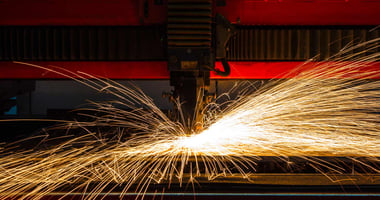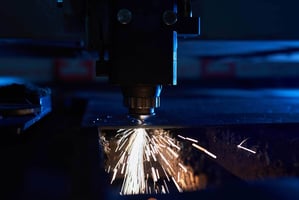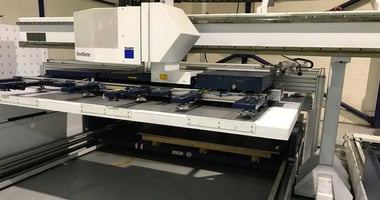In the competitive world of sheet metal manufacturing, efficiency is not just an added advantage,...
Saving time at the CNC on the shop floor
A common misconception of nesting and NC code programming software is that it only saves time for the programmer. However, the right software can provide significant savings and benefit to your staff on the shop floor. This article will outline the key features and benefits of nesting software and demonstrate how it can provide significant time savings for CNC machine operators.
Intelligent Nesting Algorithms
The core advantage of nesting software is its ability to generate high-quality, optimised nestings through sophisticated algorithms. These algorithms analyse the geometry and dimensions of each part and arrange them on the sheet metal in a manner that minimises material utilisation and optimises overall cutting time. The result is a fast, precise, and efficient cutting process that reduces scrap rates and boosts productivity. On larger jobs, it may also result in fewer sheet changes. Certain nesting algorithms, such as JETCAM's Ultra Performance Nesting also provide features that will allow the programmer to 'prefer less layouts' when generating nests. This will then create fewer nests that are run a larger number of times, reducing the number of programs that shop floor staff need to run.
By minimising the unused material between parts, nesting software ensures maximum usage of each sheet, thus reducing overall material costs and waste. This directly contributes to a more sustainable and cost-effective production process.
Grouping of parts on the nest for faster unloading
Other nesting algorithm features include progressive nesting, which can group parts on the nest, such as complete assemblies. This reduces the amount of time the operator spends 'kitting' as they unload the cutter. Hybrid progressive nesting takes this a step further, by allowing the programmer to specify a pre-defined maximum that parts can be nested away from the main group. This allows for a better balance between nesting efficiency and unloading/sorting speed.
Dynamic Machine Parameters
Nesting software accommodates a wide range of CNC machine capabilities and configurations. By incorporating machine-specific parameters such as cutting speed, head movement, and kerf width, the software can automatically generate optimised toolpaths that factor in these constraints, ultimately resulting in better efficiency and machine performance.
By operating within the optimal parameters of the CNC machine, nesting software helps reduce wear and tear on the equipment. This prolongs the machine's life and minimises the need for costly and time-consuming maintenance.
Integrated CAD/CAM Functionality
Modern nesting software offers seamless integration with popular CAD platforms such as Autodesk, SolidEdge, SolidWorks, Siemens NX and Dassault 3DX/CATIA, enabling a streamlined design-to-production workflow. This direct link ensures that the latest design changes can be easily fed to the nesting software. Revision control ensures that only the right versions of parts are made.
The integration with CAD/CAM platforms simplifies and accelerates the transition between design revisions and part production. This agility supports fast-paced, ever-changing production schedules while maintaining high-quality output.
Common Line Cutting
Advanced nesting software can also identify opportunities for common-line cutting, where two or more parts share a cut line, reducing the overall cutting distance and time. This technique not only accelerates the cutting process but also conserves material by minimising kerf loss.
Implementing common-line cutting results in shortened production cycles and increased throughput, allowing manufacturers to meet and exceed customer expectations for lead times and output capacity.
Utilisation of Remnants
Remnants are a natural by-product of nesting, when you don't have enough parts to fill a sheet. Software such as JETCAM Expert nesting can specify to use remnants first, ensuring that they are kept to a minimum on the shop floor. If the operator knows that a remnant will be used soon after it is created, there is no need for it to be moved back to stores. Also, remnants will generally be significantly smaller than a full size sheet, so will be easy to manage on the machine.
Conclusion
The combination of intelligent nesting algorithms, dynamic machine parameters, integrated CAD functionality, and cutting optimisation techniques offered by advanced nesting software such as JETCAM Expert can provide significant time savings for CNC machine operators. By optimising material usage, reducing machine downtime, and expediting production cycles, manufacturers can boost their overall efficiency and remain competitive in today's demanding market. Leveraging the power of nesting software allows businesses to unlock the full potential of their CNC machines and staff, driving their operations to new heights.
%20(Custom).jpg?width=1000&height=252&name=JETCAM%20logo%20(glossy%20effect)%20(Custom).jpg)



